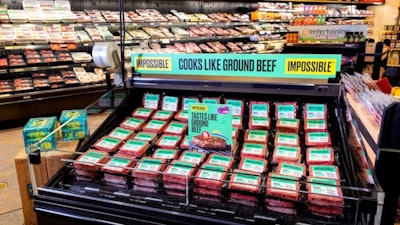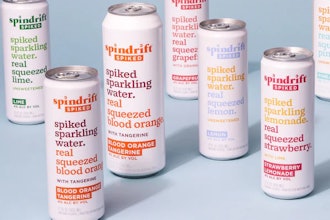
WASHINGTON — The inaugural Good Food Retail Report released Thursday by nonprofit The Good Food Institute (GFI) is the first ever to rate the top 15 US retailers on product assortment, merchandising, and marketing of plant-based meat, eggs and dairy. The report shows that Whole Foods and Kroger-owned King Soopers are leading the way in capitalizing on the booming plant-based trend. It also recognizes Giant Food and Wegmans for strong plant-based performance. Plant-based foods are a growth engine in retail, with sales growing more than five times faster than total food sales.
Covid-19 lockdowns have resulted in a huge surge in demand for plant-based foods. Some top retailers are doubling down on their own plant-based product lines in 2020 as mainstream consumer demand continues to increase. Kroger will launch at least four new plant-based product types in the second and third quarters, and Target aims to more than double their store-brand plant-based assortment in 2020.
Whole Foods and King Soopers have the best overall plant-based assortments of the top retailers, with 360 and 410 plant-based products on shelves, respectively; ample store-brand collections; and a wide variety of plant-protein products in prepared food settings. King Soopers and Whole Foods both offer 50 percent more plant-based options than most other top retailers, whose plant-based selections average 270 products.
King Soopers boasts at least 38 store-brand plant-based meat and dairy products, which is the best assortment of the top retailers. On average, the top retailers offer just 15 plant-based store-brand products, presenting significant opportunities to expand store-brand product development across categories to capitalize on the mainstreaming of flexitarianism.
Kroger Senior Vice President of Merchandising Joe Grieshaber: “Kroger anticipates interest in plant-based products to continue to grow in 2020, with the category being one of the key drivers of our natural and organic sales.”
Whole Foods has the best plant-based in-store foodservice offerings and provides plant-based meat in three times as many prepared food settings as other top retailers, thereby increasing customer access to convenient plant-based foods and meals.
Whole Foods Market SVP of Global Culinary Procurement & Operations Jeff Turnas: “Whole Foods Market has long been a champion of plant-based eating. We feature a wide variety of alternative protein options across our store, including high-quality, chef-inspired vegan and vegetarian options in our Prepared Foods Department, which includes our Chef’s Case, salad bar, hot bar, and a variety of convenient grab-and-go items.”
Whole Foods Market VP of Grocery Dan Epley: “We’ve seen significant increases across our plant-based offerings since the early stages of Covid-19. Our teams continue to work hard to maintain our leadership across these market segments during these unprecedented times.”
Wegmans is the top performer in terms of absolute number of products on shelf, with 530 products available, including twice as many plant-based meat products and four times as many plant-based cheese products as most other top retailers. The development of additional store-brand products and expanded plant-based offerings in prepared food settings would raise Wegmans even further through the ranks as a plant-based leader in 2020.
The top retailers are making great strides in merchandising, with 91 percent shelving plant-based products alongside their conventional counterparts in at least two categories and 65 percent offering at least one plant-based meat product in the meat aisle. Giant Food does the best plant-based merchandising, shelving multiple plant-based products alongside their animal-based counterparts in 10 out of 11 product categories.
Despite this progress, the report identifies opportunities for retailers to further integrate plant-based foods with their conventional counterparts across all categories and to adopt inclusive “plant-based” or “plant-protein” language in signage to appeal to all customers.

GFI Associate Director of Corporate Engagement Caroline Bushnell: “Traditional meat eaters and flexitarians are embracing plant-based products, which means it is critical for retailers to employ plant-based strategies that attract the mainstream consumer. Plant-based eating is no longer niche. Retailers are leaving money on the table when they isolate plant-based sets in hard-to-find sections or use exclusive category language, like ‘vegetarian.’”
With analysts predicting that the plant-based market will grow 28 percent per year to $85 billion in 2030, plant-based is one of the biggest trends in food. As the Good Food Retail Report demonstrates, the plant-based trend is in full effect at the country’s largest grocery chains.
Methodology
The Good Food Retail Report evaluates the top 15 U.S. food retailers according to product assortment, merchandising, and marketing of plant-based meat, eggs, and dairy. GFI collected the data through in-store audits (March 1, 2019–October 31, 2019) and online content (available January 1, 2019–January 31, 2020). GFI shared individual results with each retailer, offering the opportunity to update the analysis. Ratings are included for 23 chains owned by the top 15 U.S. food retailers with 100+ locations each. Parent companies are not evaluated in aggregate.
The Good Food Institute is an international nonprofit building a sustainable, healthy, and just global food system. With unique insight across the scientific, policy, industry, and investment landscapes, we are using the power of food innovation and markets to accelerate the transition of the world’s food system toward alternative proteins. GFI is powered by philanthropy.
Top insights:
- Whole Foods and Kroger-owned King Soopers have the best overall plant-based assortments of the top 15 U.S. retailers. They offer 360 and 410 plant-based products on shelves, respectively, which is 50 percent more than most other top retailers, who offer an average of 270 products. Whole Foods and King Soopers also offer expansive store-brand collections and a wide variety of plant-protein products in prepared food settings.
- King Soopers has the best plant-based store-brand assortment, boasting 38 store-brand plant-based products, while other top retailers offer an average of 15 plant-based store-brand products.
- Whole Foods has the best plant-based in-store foodservice offerings and provides plant-based meat in three times as many prepared food settings as other top retailers.
- Wegmans offers the most on-shelf plant-based products of the top retailers, with 530 products available on store shelves, including twice as many plant-based meat products and four times as many plant-based cheese products as most other retailers.
- Giant Food does the best plant-based merchandising, shelving multiple plant-based products alongside their animal-based counterparts in 10 out of 11 product categories.
- Ninety-one percent of top retailers shelve plant-based products alongside their conventional counterparts in at least two categories, and 65 percent offer at least one plant-based meat product in the meat aisle.
- Sixty-five percent of top retailers use “plant-based” or similar plant-forward terms in place of “vegan” or “vegetarian” in marketing and promotions to appeal to a wider audience.
- Fifty-seven percent of top retailers feature aisle signage for plant-based refrigerated or frozen meat products.
- More than 80 percent of top retailers offer at least 10 different refrigerated plant-based meat products.
- Top retailers as a whole excel at providing plant-based milk products, boasting on average 70–90 plant-based milk products.
- Approximately 50 percent of top retailers carry a plant-based egg product.






















